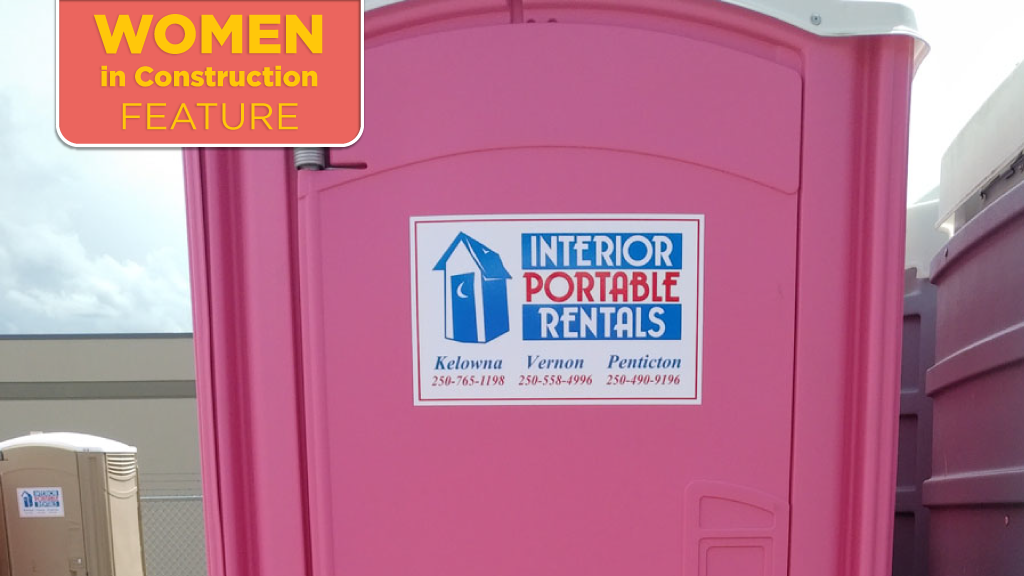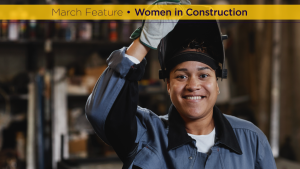It may not be the traditional welcome mat, but the pink portable toilet is becoming a sign of changing attitudes at construction sites as more women enter the job site.
A survey conducted by the BC Construction Association indicates the industry is becoming increasingly diverse, with 10,667 credentialed tradeswomen now working in construction in the province. Women now make up 6.2 per cent of the workforce, a 35 per cent increase over a five-year period.
“I started noticing about three years ago that companies were asking for gender specific units on site,” said Jason Doell, owner of Kelowna Interior Rentals, which stocks pink portable toilets. “We have ordered a lot of (pink) stock to accommodate the on-going demands for them at the job site.”
Doell said the female specific portable toilets differ from the male units in that they have the urinal removed while both are stocked with the usual sanitary paper and hand sanitizer.
Portable toilets with the distinctive rosy huge are popping up all across Canada and the U.S. “It is something that is being adopted more and more,” said Chase Henituik, Handi-Can’s operational manager, and whose major clientele is the construction trade in Alberta. “We have specific pink toilets – it is a unit that only women use.”
Just as in B.C., Henituik said designated washrooms are mandated by Alberta’s Occupation Health and Safety regulation and for the most part the larger companies are now complying. But, he feels there still could be more enforcement to ensure regulation adherence as women are more common on sites today. Women are still reluctant to complain, he said.
Companies also need to be better educated and sensitive to the needs of women in the workplace, Henituik said. When a company orders portable toilets without any reference to the two genders, he will often offer a pink unit at a discount simply to create awareness of the availability of the units and how these units meet the specific needs of women.
Handi-Can’s pink units also have the urinal removed but come with a wall-mounted shelf and mirror. The company also supplies bags for personal hygiene products that cannot be deposited in a portable toilet. Where companies fall down, said Henituik, is that they fail to put a garbage can outside washrooms so that women do not have to carry bagged hygiene products to a dumpster elsewhere on site. “Otherwise, the bags are not used,” he said, and, disposal companies struggle with clogged lines when emptying portable units.
Henituik said that COVID has played a role in the education process of separating washroom facilities. In the worst case scenario, trades will arrive on site and use the general contractor’s facilities. “A washroom is the place where you are going to get cross-contamination,” he said. On sites with greater awareness, the trades will order their own facilities and be confined to using those facilities.
It is common to place locks on the women’s units and provide the women on site with access keys. But that practice has become extended over most construction sites washrooms during COVID as it also prevents non-construction workers from using the facilities.
Henituik said that Handi-Can also offers heated units, including pink ones, for use on construction sites during winter. “They go pretty fast in winter,” he said, although they are more expensive. There are also crane-able units that can be raised onto the upper levels of high-rise construction sites.
Gender specific units can also prevent harassment or graffiti directed at women, as portable urinal walls turn into impromptu blackboards for the disgruntled. “I’ve never had a women’s unit come back with graffiti,” said Kyle Frederkind, territory manager for B.C.’s Maple Leaf Disposal. His company doesn’t deploy pink toilets but does puts a sticker on units for female use and modifies them with a sink and foot pedal pump for water, paper towels and garbage can. The male units are another story with graffiti. “Usually it’s about co-workers or supervisors,” he said but he’s seen everything in terms of script and graphics.
There can also be a difference in the standard of cleanliness that women require as Frederkind admits that some of the men’s units can become extremely messy and can double as garbage receptacle when employees can’t find an easy garbage can. “You want to be comfortable and not walk into something that looks like a bomb has gone off,” he said.
Frederkind said that he noticed an uptick in demand for gender specific units approximately five years ago and it has continued. Frederkind, who previously worked in transporting cranes to construction sites, saw more women appearing on sites. “It has really transcended during the past five years – it’s been a massive change,” he said. “Not just women working on site but women holding positions of power such as supervisors.”











Recent Comments